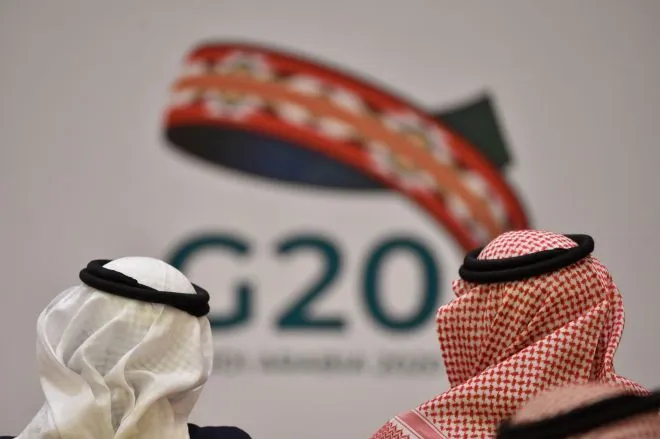
The 15
th meeting of Group of Twenty (G20) countries is to be held on 21-22 November 2020. As currently, Saudi Arabia holds the Presidency of G20, the summit was originally scheduled to be convened in Riyadh, Saudi Arabia. But, due to the ongoing pandemic, it will be held
virtually. The summit is likely to
focus on addressing various implications of coronavirus pandemic, future health care plans, and steps to revive the global economy.
International Monetary Fund (IMF) in its October
World Economic Outlook (WEO) projected -4.4% global growth in 2020. This new projection is slightly less severe than the June WEO forecast. This marginal improvement in global growth is mainly due to "better than anticipated" GDP performance in advanced economies in the third quarter of this calendar year.
However, this pandemic is set to reverse global economic progress achieved since the 1990s. Global poverty and inequality levels across the countries are going to aggravate. IMF estimates that around 90 million people this year may fall below the daily income threshold of $1.90, signifying extreme deprivation. It projects social distancing to continue in 2021 and gradually fade when vaccine coverage expands. It may be the end of 2022 when local transmissions will reach low levels everywhere. But these are baseline projection scenarios and the probability of slipping from this baseline remains quite high.
Therefore, the policymakers have to grapple with complex challenges for restoring economies in a path of higher productivity growth while ensuring gains to be distributed evenly and keeping the national debt burden sustainable. Fighting the deep near-term recession is not an easy task either, but the fight will continue in the long term.
The G20 countries produce around 80% of the world’s output, have two-thirds of the global population, and constitute three-quarters of international trade. Though originally established to deal with international macro-financial issues and regulation, this forum for international economic cooperation expanded its agenda to cover socio-economic and development issues. It is for this reason expectations from the G20 summit this year are disproportionately high.
The
G20 countries produce around 80% of the world’s output, have two-thirds of the global population, and constitute three-quarters of international trade. Though originally established to deal with international macro-financial issues and regulation, this forum for international economic cooperation expanded its agenda to cover socio-economic and development issues. It is for this reason expectations from the G20 summit this year are disproportionately high.
What are the expectations?
In March, the G20
announced that more than $5 trillion would be injected to neutralise the adverse impact of the pandemic. Individually member countries made various announcements, but there is an expectation of a collective economic stimulus programme. Saudi Arabia reported that the country has contributed around $11 trillion to protect the global economy.
A framework for debt reductions for poorer countries is also on the wish list. A
moratorium on debt service payments for the poorest countries, reportedly, has freed $14 billion to immediately invest in health systems and social programmes. Apparently, 43 different countries have benefitted till now. Saudi Arabia, as the holder of the Presidency, intends to coordinate with the IMF and World Bank. So, the expansion of debt relief is widely expected.
The third broad expectation is related to health care. A good part of the expected economic stimulus should contribute to health care. But whenever the vaccines arrive equitable and affordable access for all would be the most crucial element to fight and finally defeat this pandemic. The US pharma company Pfizer and German biotech company BioNtech have
announced 90% effectiveness of their joint vaccine, stating that 50 million doses can be produced by the end of 2020 and up to 1.3 billion doses in 2021. Immediately, at least 500 million doses have been booked by a handful of high-income countries, including the US, UK, Canada, Australia, and the European Union (EU). Reservation of vaccine doses by these high-income countries may go up to more than
1 billion through advanced purchase agreements. During the 2009 swine flu pandemic, the widespread use of these advanced purchase agreements resulted in a situation, where the majority of vaccine manufacturers were unable to provide 10% of vaccine stock to United Nations agencies due to their pre-existing commitments to the wealthier countries.
Therefore, only a small fraction of the future global COVID-19 vaccine pool will be available to other countries. The countries with deep pockets are likely to corner the lion’s share whenever the vaccine is commercially produced. Being the most influential economic and strategic block, G20 is expected to address and mitigate this build-up of global vaccine inequality.
The G20 expectations this time are built around these three broad pillars. Are these expectations going to be fulfilled, or at least be addressed?
What may transpire
The G20 is constituted by the EU and 19 other countries. These are Argentina, Australia, Brazil, Canada, China, Germany, France, India, Indonesia, Italy, Japan, Mexico, Russia, Saudi Arabia, South Africa, South Korea, Turkey, the UK, and the USA.
The USA and China have been engaged in a bitter trade and economic war for the past two years. Though there is a change of guard at the White House, the hostility is likely to linger. Moreover, the inauguration of the new President is scheduled for January next year. Meanwhile, President Trump will attend the summit, and given his past record, it is better to expect the unexpected. Extreme uncertainty and hostility between the two largest economies of the world may not serve the greater global causes well at G20.
Saudi Arabia and Russia were deeply embroiled in a global
oil price war before the pandemic. Russia, in its bid to hurt the US shale oil producers, refused to cut down production. In response, Saudi Arabia flooded the market and pushed the prices further down. The pandemic somehow made these two countries see reasons, and a deal to cut production has been reached – ostensibly mediated by President Trump. Though the price war is paused, there is no guarantee that Russia would not go back to its original strategy to hurt the US producers whenever an opportunity comes. Once again, the current US President's unpredictability at the summit is the unknown factor here.
India and China continue to lock horns in a bitter border stand-off in eastern Ladakh for over six months now. Despite China’s border aggression, Indian Prime Minister Narendra Modi has shared a virtual platform with Chinese President Xi Xinping in recent SCO (Shanghai Cooperation Organisation) and BRICS summits. However, it will be unwise to expect these two countries to freely discuss and resolve global economic recovery, setting aside the present conflict.
India and China continue to lock horns in a bitter border stand-off in eastern Ladakh for over six months now. Despite China’s border aggression, Indian Prime Minister Narendra Modi has
shared a virtual platform with Chinese President Xi Xinping in recent SCO (Shanghai Cooperation Organisation) and BRICS summits. However, it will be unwise to expect these two countries to freely discuss and resolve global economic recovery, setting aside the present conflict.
Recent Paris and Nice "Islamic terror" attacks have created fissures not only within the society and polity of France but those have also resulted in sharp verbal exchanges with other Muslim-majority countries like Turkey. French President Macron has vowed to protect secularism as a pillar of French policy and society and found support from other countries including India. However, support for France from the EU has been fragmented and muted.
So, the G20 cannot be visualised as a homogeneous forum where countries have decisively prioritised international cooperation for greater good.
One may point out that international diplomatic and cooperation platforms like G20, under normal circumstances, should be treated above these bilateral tensions and fissures. However, in a contracting global economy where almost all major countries are looking inwards to protect their economy and people hit by this unprecedented pandemic, it may be imprudent to think so. Expecting normalcy in historic abnormal times is less likely to result in a coherent reading of the current global dynamics.
Therefore, high expectations for the G20 summit need to be rationalised and moderated according to the existing international situation. Equitable and affordable access to vaccines and expanding the scope of debt relief programme for the poorer countries would be two ideal achievable pivots, around which such rationalisation can be done.
The views expressed above belong to the author(s). ORF research and analyses now available on Telegram! Click here to access our curated content — blogs, longforms and interviews.



 The 15th meeting of Group of Twenty (G20) countries is to be held on 21-22 November 2020. As currently, Saudi Arabia holds the Presidency of G20, the summit was originally scheduled to be convened in Riyadh, Saudi Arabia. But, due to the ongoing pandemic, it will be held
The 15th meeting of Group of Twenty (G20) countries is to be held on 21-22 November 2020. As currently, Saudi Arabia holds the Presidency of G20, the summit was originally scheduled to be convened in Riyadh, Saudi Arabia. But, due to the ongoing pandemic, it will be held  PREV
PREV


